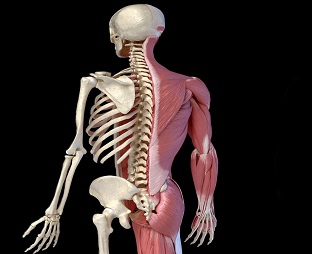Brazilian Study Validates That COVID-19 Infections Also Affects The Musculoskeletal System
COVID-19 News - Musculoskeletal System May 06, 2023 2 years, 9 months, 2 weeks, 4 days, 18 hours, 34 minutes ago
COVID-19 News: The COVID-19 pandemic has resulted in millions of deaths worldwide, and now the more aspects of the long-term consequences of the disease are starting to be revealed. Though primarily affecting the respiratory system, COVID-19 can also have significant effects on other areas of the body, resulting in extrapulmonary complications as well. Studies, cases reports and past
COVID-19 News coverages have already shown that patients with COVID-19 often experience symptoms beyond respiratory distress, including anosmia, ageusia, diarrhea, headache, fatigue, and cognitive dysfunction.

Researchers have also observed that COVID-19 can impact the musculoskeletal system, with muscle and joint pain, ‘bone burning’ and reduced bone mineral density reported in both acute and chronic phases of the disease.
Researchers from Universidade Federal de Minas Gerais, Brazil, in a new study investigated the impact of acute coronavirus infection on bone metabolism in mice. The study revealed that the SARS-CoV-2 virus triggers a TNF-dependent osteoporotic phenotype in mice.
The study team first examined serum levels of RANKL and osteoprotegerin in patients with acute COVID-19. They then evaluated the effects of MHV-3 (a murine betacoronavirus) infection on osteoclasts and osteoblasts in vitro and in vivo. Finally, the role of TNF in the bone phenotype associated with the SARS-like disease induced by MHV-3 in mice was investigated.
The study findings showed that patients with acute COVID-19 had decreased serum levels of osteoprotegerin and an increased RANKL/OPG ratio in the serum versus healthy individuals.
The study findings also showed that the MHV-3 virus could infect and increase the differentiation of osteoclasts and also lead to TNF release.
It was found that in vivo, MHV-3 lung infection triggered bone resorption in the femur of mice, increasing the number of osteoclasts at 3dpi and decreasing at 5dpi. Indeed, apoptotic-caspase-3+ cells have been detected in the femur after infection as well as viral RNA. RANKL/OPG ratio and TNF levels also increased in the femur after infection. Accordingly, the bone phenotype of TNFRp55−/− mice infected with MHV-3 showed no signs of bone resorption or increase in the number of osteoclasts.
This supports the hypothesis that COVID-19 could affect the musculoskeletal system, as the cytokine storm induced by the infection is known to create a systemic inflammatory environment conducive to bone resorption.
The researchers also found that TNF plays a crucial role in triggering osteoclast formation in the context of COVID-19.
Clinical trials targeting the TNF pathway are currently underway, and there is evidence that anti-TNF therapy can help to reduce inflammation and facilitate clinical recovery in severe COVID-19 cases.
Preventing COVID-19 symptoms may also help to reduce the risk of extrapulmonary effects, such as bone resorption.
In conclusion, the study revealed that the MHV-3 coronavirus can induce an osteoporotic phenotype in mice by triggering a TNF-dependent inflammatory environment in the bone, potentially stim
ulating the differentiation of osteoclasts through macrophage infection. These findings are consistent with the clinical evidence of an increased RANKL/OPG ratio observed in severe COVID-19 patients.
This study highlights the importance of further research into the potential consequences of COVID-19 on bone metabolism and the need for effective treatments to address these issues.
Despite its limitations, such as the differences in receptor interaction between MHV-3 and SARS-CoV-2, the transient nature of the lung disease caused by MHV-3, and the liver disease triggered by MHV-3 at later timepoints, this study serves as an important platform for understanding the potential consequences of COVID-19 on bone metabolism. As the long-term effects of the pandemic continue to be discovered, the importance of understanding and addressing the impact of COVID-19 on various bodily systems becomes increasingly critical.
The study findings were published in the peer reviewed journal: Life Sciences
https://www.sciencedirect.com/science/article/pii/S0024320523003843
For the latest
COVID-19 News, keep on logging to Thailand Medical News.
Read Also:
https://www.thailandmedical.news/news/breaking-new-hong-kong-study-reveals-that-sars-cov-2-infections-also-causes-inflammatory-bone-loss-leading-to-long-covid-skeletal-health-issues
https://www.thailandmedical.news/news/sars-cov-2-can-infect-bone-marrow-derived-macrophages-and-alter-the-expression-of-macrophage-chemotaxis-and-osteoclast-related-genes
https://www.thailandmedical.news/news/breaking-covid-19-latest-university-of-manchester-study-shows-that-sars-cov-2-mutilates-blood-marrow-cells-
